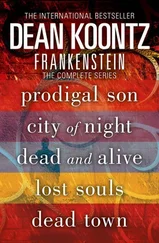She returned to the television.
“That's a special little kid,” Tom said thoughtfully.
“Really cute,” Paul agreed.
Cuteness wasn't the quality Tom had in mind.
“How's she taking her grandpa's death?” Paul asked.
“Little trouper."
Sometimes Angel seemed troubled by what she'd been told about her grandfather, and at those moments she appeared downcast, somber. But she was just three, after all, too young to grasp the permanence of death. She would probably not have been surprised if Harrison White had walked through the door in a little while, during The Man from U.N.C.L.E. or The Lucy Show.
While they waited for the room-service waiter to arrive, Tom got from Paul a detailed report of Enoch Cain's attack on the parsonage. He had heard most of it from friends in the state-police homicide division, which was assisting the Spruce Hills authorities. But Paul's account was more vivid. The ferocity of the assault convinced Tom that whatever the killer's twisted motives might be, Celestina and her mother-and not least of all Angel-were in danger as long as Cain roamed free. Perhaps as long as he lived.
Dinner arrived, and Tom persuaded Celestina and Grace to come to the table for Angel's sake, even if they had no appetite. After so much chaos and confusion, the child needed stability and routine wherever they could be provided. Nothing brought a sense of order and normality to a disordered and distressing day more surely than the gathering of family and friends around a dinner table.
Although, by unspoken agreement, they avoided any talk of loss and death, the mood remained grim. Angel sat in thoughtful silence, pushing her food around her plate rather than eating it. Her demeanor intrigued Tom, and he noticed that it worried her mother, who put a different interpretation on it than he did.
He slid his plate aside. From a pocket, he withdrew a quarter, which always served him as well with children as with murderers.
Angel brightened at the sight of the coin turning end-over-end across his knuckles. “I could learn to do that,” she asserted.
“When your hands are bigger,” Tom agreed, “I'm sure you could. In fact, one day I'll teach you."
Clenching his right hand around the quarter, waving left hand over right, he intoned, “Jingle-jangle, mingle-jingle.” Opening his right hand, he revealed that the coin had vanished.
Angel cocked her head and studied his left hand, which he had closed while opening his right. She pointed. “It's there."
“I'm afraid you're wrong.” When Tom opened his left hand, the palm lay as bare as that of a blind beggar in a country of thieves. Meanwhile, his right hand had tightened into a fist again.
“Where did it go?” Grace asked her granddaughter, making as much effort as she could to lighten the mood for the girl's sake.
Regarding Tom's clenched right hand with suspicion, Angel said, “Not there."
“The princess is correct,” he acknowledged, revealing that this hand was still empty. Then he reached to the girl and plucked the quarter from her ear.
“That's not magic,” Angel declared.
“It sure looked like magic to me,” said Celestina.
“Me too,” Paul agreed.
Angel was adamant: “Nope. I could learn that. Like dressing myself and saying thank-you."
“You could,” Tom agreed.
With his bent thumb against the crook of his forefinger, he flipped the quarter. Even as the coin snapped off the thumbnail and began to stir the air, Tom flung up both hands, fingers spread to show them empty and to distract. Yet on a second look, the coin was not airborne as it had seemed to be, no longer spinning-wink, wink-before their dazzled eyes. It had vanished as though into the payment slot of an ethereal vending machine that dispensed mystery in return.
Around the dinner table, the adults applauded, but the tougher audience squinted at the ceiling, toward which she believed the coin had arced, then at the table, where it ought to have fallen among the water glasses or in her creamed corn. At last she looked at Tom and said, “Not magic."
Grace, Celestina, and Paul expressed amusement and amazement at Angel's critical judgment.
Undeterred, the girl said, “Not magic. But maybe I can't learn to do that one, ever."
As though stirred by static electricity, the fine hairs on the backs of Tom's hands quivered, and a current of expectation coursed through him.
Since childhood, he had been waiting for this moment-if indeed it was The Moment-and he had nearly lost hope that the much-desired encounter would ever come to pass. He had expected to find others with his perceptions among physicists or mathematicians, among monks or mystics, but never in the form of a three-year-old girl dressed all in midnight-blue except for a red belt and two red hair bows.
His mouth was dry when he said to Angel, “Well, it seems pretty magical to me-that flipped-coin trick."
“Magic is like stuff nobody knows how it happens."
“And you know what happened to the quarter?"
“Sure."
He couldn't work up sufficient saliva to get the rasp out of his voice: “Then you could learn to do it."
She shook her head, and red bows fluttered. “No. 'Cause you didn't just move it around."
“Move it around?"
“From this hand here to that one, or somewhere."
“Then what did I do with it?"
“You threw it into Gunsmoke, “ Angel said.
“Where?” asked Grace.
Heart racing, Tom produced another quarter from a pants pocket. For the benefit of the adults, he performed the proper preparation-a little patter and the ten-finger flimflam-because in magic as in jewelry, every diamond must have the proper setting if it's to glitter impressively.
In the execution, he was likewise scrupulous, for he didn't want the grownups to see what Angel saw; he preferred they believe it was sleight of hand-or magic. After the usual moves, he briefly closed his right hand around the coin, then with a snap of his wrist, flung it at Angel, simultaneously distracting with flourishes aplenty.
The three adults exclaimed at the disappearance of the quarter, applauded again, and looked knowingly at Tom's hands, which had closed at the sudden conclusion of all the flourishes.
Angel, however, focused on a point in the air above the table. Faint furrows marked her brow for a moment, but then the frown gave way to a smile.
“Did that one go to Gunsmoke, too?” Tom asked hoarsely.
“Maybe,” said Angel. “Or maybe to The Monkees ... or maybe to where you didn't get run down by the rhinosharush."
Tom opened his empty hands and then filled one of them with his water glass. The rattling ice belied his calm face.
To Paul Damascus, Angel said, “Do you know where bacon comes from?"
“Pigs,” Paul said.
“Noooooooo,” Angel said. She giggled at his ignorance.
Celestina stared curiously at Tom Vanadium. She had witnessed the effect of vanishment, though she hadn't actually seen the coin disappear in midair. Yet she seemed to sense either that something more than sleight of hand had just transpired or that the trick had a meaning she'd missed.
Before Celestina probed and perhaps touched upon a sore tooth of truth, Tom launched into the story of King Obadiah, Pharaoh of the Fantastic, who had taught him all he knew about sleight of hand.
Later, after they finished eating but were still sitting at the table over coffee, the conversation turned solemn, although for the moment, the subject wasn't the late Harrison White. How long the two women and the girl must hide out, when and where they would be able to resume lives as normal as might still be possible for them: These were the issues of the moment.
The longer they were required to lie low in fear, the more likely Celestina would be to cast caution aside and return to Pacific Heights, Tom knew her well enough to be sure that she was a fighter rather than a runner. Being in hiding frustrated her. Day by day, hour by hour, with no target date for resuming a normal life, she would quickly lose patience. Rubbed raw, her dignity and sense of justice would compel her to act-perhaps more out of emotion than out of reason.
Читать дальше











